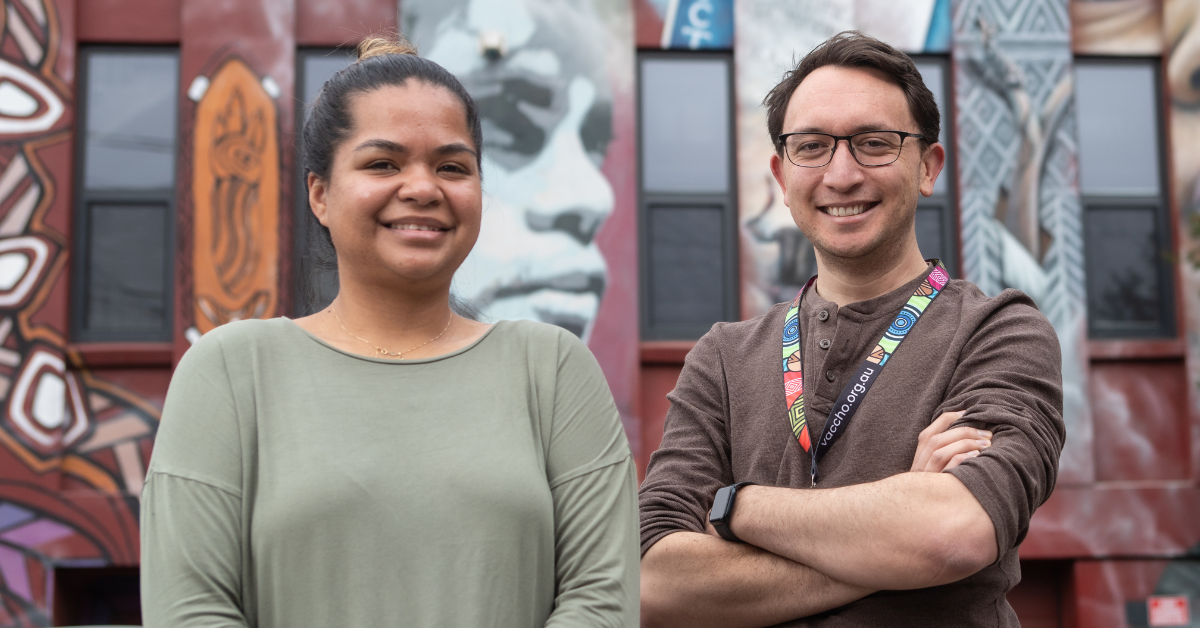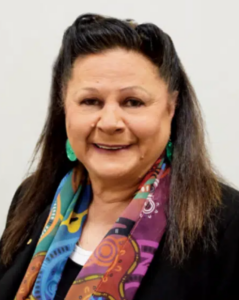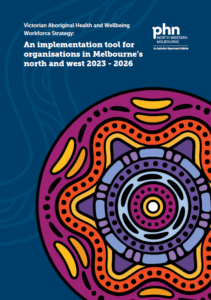
Victorian Aboriginal Community Controlled Health Organisation (VACCHO) staff Jessica Mitchell (left) and Abe Ropitini (right). Image credit: Leigh Henningham.
Efforts to close the health and life expectancy gaps between Aboriginal and Torres Strait Islander and non-Indigenous communities are ongoing and urgent.
An important way to achieve that is to ensure organisations operate in ways that embrace Aboriginal cultures and practices. The Victorian Aboriginal Community Controlled Health Organisation (VACCHO) is acutely aware of this. For nearly 3 decades, it has been advocating for vibrant, healthy, self-determining Aboriginal communities.
A key part of this work is the creation and rollout of the Victorian Aboriginal Health and Wellbeing Workforce Strategy 2022–26. This plan supports a strong and able workforce across VACCHO’s 33 member organisations, delivering holistic wellbeing services to Aboriginal people.
However, for this vision to be achieved other organisations must also contribute, says VACCHO’s chief executive, Jill Gallagher AO.

“The Aboriginal community-controlled health sector is leading the way in providing culturally safe services, but we are not immune to the challenges of workforce shortages and infrastructure limitations,” she said.
“With a rapidly growing population, we need all services in the health system to deliver culturally safe care.
“It’s vital that there is no wrong door for Aboriginal families in being able to gain access to quality, culturally safe healthcare that is delivered in a high-trust environment.”
With this in mind, North Western Melbourne Primary Health Network (NWMPHN) commissioned VACCHO to develop a toolkit to help mainstream organisations in Melbourne’s north and west implement the health and wellbeing strategy.

The toolkit shows management and staff how to:
- learn about Aboriginal and Torres Strait Islander cultures
- support better health and wellbeing outcomes for Aboriginal people
- build a culturally safe and appropriate workplace
- recognise and embed Aboriginal ways of knowing, being and doing
- increase the number of Aboriginal and Torres Strait islander employees.
The toolkit is now available, free. We encourage all health and community service providers to use it.
NWMPHN CEO Christopher Carter said the kit provides practical ways for mainstream organisations to support the work of Aboriginal community-controlled organisations.
“NWMPHN has a longstanding and treasured partnership with VACCHO and other Aboriginal-led organisations,” he said.
“We recognise that sovereignty has never been ceded, and that self-determination is crucial for systemic reform.
“However, the broader health sector also has a part to play. This implementation tool provides practical ways for organisations to refine structures and processes to better support culturally appropriate and safe practices.
“By normalising these, we can drive better outcomes and improved health equity for Aboriginal people in Victoria.”
VACCHO’s executive director of population health, Abe Ropitini, reinforced this statement.
“Although we have an Aboriginal community-controlled sector, with a workforce that we need to further grow and enhance the capability of, we also have a health system which has a key responsibility to produce equitable outcomes in closing the gap more holistically,” he said.
“It’s critical that everybody involved in both these levels of the health system know what their roles, responsibilities and capabilities need to be in respect to working with Aboriginal people.”
Jessica Mitchell, VACCHO’s executive manager of workforce development, said that leaders in mainstream organisations have a key role to play in enabling more holistic care.
“We know that there’s a strong connection between strong culture and identity and great health outcomes,” she said.
“By leaders doing all the things contained within this kit, it enables Mob to feel empowered in health care settings, and able to make their own decisions towards their health in the future.”
Read our full interview with Abe and Jessica here.




